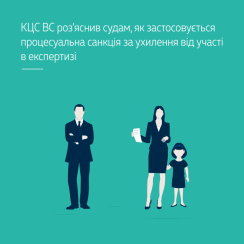Contact center of the Ukrainian Judiciary 044 207-35-46

District court dismissed the claim on the contestation of paternity. The judgment was upheld by appeal court.
The judgments were motivated with the fact that the plaintiff had not denied his paternity as for a child, this fact had been established by judgment on maintenance recovery from the plaintiff, therefore it should not be a matter of proof. At the moment of the submission of claim on the paternity examination, the plaintiff knew exactly that he was not father of the child; however, he agreed to be recorded as her father.
The Supreme Court represented by the panel of judges of the First Judicial Chamber of the Civil Cassation Court has cancelled the judgments and sent the case for its new consideration by the appeal court in the view of the following.
Pursuant to Article 56 of the Marriage and Family Code of Ukraine (at the moment of disputable legal relations), a person recorded as father of a child upon his claim or upon a common claim with the child’s mother shall not have right to appeal the paternity, if at the moment of the claim submission he knew, that in fact he was not that child’s father.
The European Court of Human Rights remarked that “today a DNA test is the only scientific method of determining accurately the paternity of the child in question; and its probative value substantially outweighs any other evidence presented by the parties to prove or disprove the fact of the disputed paternity” (Judgment of 7 May 2009 in the case of Kalacheva v. Russia, application no. 3451/05, § 34).
While dismissing the claim, the court has taken account of the provisions of Article 56 of the Marriage and Family Code of Ukraine and adopted its judgment on the grounds of contradictory statements of the parties, particularly the defendant, regarding the plaintiff’s awareness of the fact that he was not the child’s father at the moment of the registration. Herewith, the court did not take into account the fact that the plaintiff could know with certainty about his paternity as for the child only after holding and familiarization with the results of molecular genetic testing (DNA testing), which was avoided by the defendant.
The issue on origin of the child shall be solved by court on the grounds of any evidence about this. And the results of testing, including the forensic genetic one, shall be assessed taking into account Article 212 of the Civil Procedure Code of Ukraine (at the moment of consideration), pursuant to which no evidence has to court a pre-set value; the court evaluates the evidence in total; the results of evaluation of evidence the court shall show in the decision, where the reasons for its acceptance or denial of are indicated. In case of avoidance of the person who is involved in a case from submitting necessary materials, documents etc., and if it is impossible to conduct the examination, the court, pursuant to Article 146 of the Civil Procedure Code of Ukraine, may acknowledge the fact the examination has been appointed to determine, or to deny in it acknowledgement (depending on who of the parties is avoiding, and the examination value for them).
Having established that the reason of the expertise failure had consisted of the defendant’s and the child’s non-attendance to the examination, the appeal court, in violation of requirements of the procedural law, did not provide these circumstances, as well as the plaintiff’s relevant arguments, with the appropriate legal assessment. Herewith, the court did not establish, whether that had been the defendant’s deliberate act, since the case materials do not include the evidence of her appropriate informing about the time and place of submitting biological materials to hold the noted examination.
Resolution of the Supreme Court of 6 May 2020 in the case No. 201/11183/16‑ц (Proceedings No. 61-23601св18) – http://www.reyestr.court.gov.ua/Review/89130842.